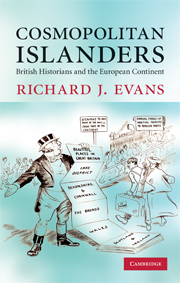2 - The view across the Channel
Published online by Cambridge University Press: 07 October 2009
Summary
How far back does the interest of British historians in the European past go? And what forms has it taken over the years? Answering this question is bound up with the general development of the historical profession in Britain itself. There have always been historians in the British Isles, stretching back at least as far as the Venerable Bede (672/3–735). But the teaching of History as a separate discipline is a relatively recent development. For a long time, the study of history was fundamentally a branch, first, of Christian ethics, then of literature and philosophy. True, Chairs of History were founded at Glasgow University in 1692, at Edinburgh in 1719 and at St Andrews in 1737, and the Regius Chairs of Modern History at Oxford and Cambridge were established by King George I in 1724. But there were no examinations in History, no syllabus in History, and no Faculties of History, nor were there to be any at British universities until the 1870s. Most students took pass degrees, involving a mixture of subjects, and avoided specializing in any one of them. Although the Regius Chairs had been founded mainly to give lectures that would prepare young men for government service, their status as royal appointments, and their handsome salaries, soon made them into government sinecures, to be handed out by the Prime Minister of the day in return for favours, or to cement political alliances. The Regius Professors thus did little in practice to foster the study of the subject for which they were nominally responsible.
- Type
- Chapter
- Information
- Cosmopolitan IslandersBritish Historians and the European Continent, pp. 59 - 101Publisher: Cambridge University PressPrint publication year: 2009



